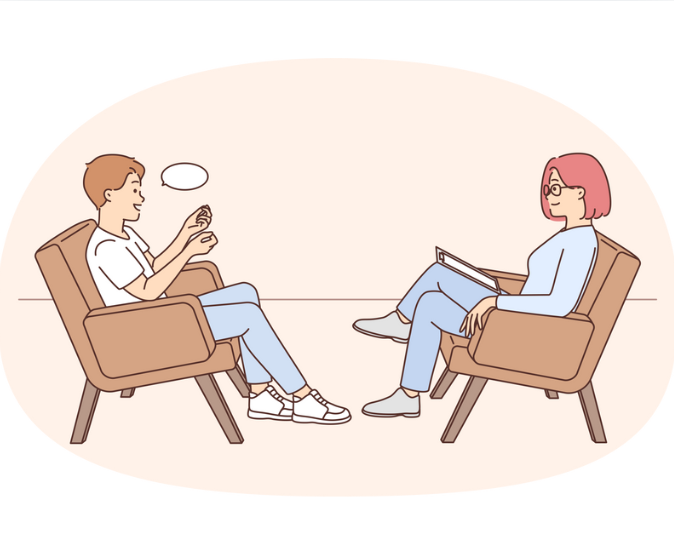Where to go and whom to talk to for treatment of Mental Illness
What is it:
Reaching out for support with mental health can be more challenging than seeking help for physical
ailments. Mental illness still carries a stigma, particularly in developing countries. Limited access
to Mental Health Professionals (MHPs) further compounds the issue. Taking that first step towards
seeking help is important for well-being, even without a clear mental illness concern.

Professionals role and responsibilities in Mental Illness
treatment:
- Neurologist: Specializes in diagnosing and treating disorders of the brain,
spinal cord, and
nerves. Treats conditions like Alzheimer's, Parkinson's, epilepsy, and multiple sclerosis. Not
typically involved in treating mental health issues unless there is a neurological component.
-
Psychiatrists: Only psychiatrists can prescribe and manage medications. They have a
medical degree
(MD in Psychiatry). Common mental illnesses that psychiatrists diagnose include schizophrenia,
bipolar disorder, depression, anxiety disorders, trauma-related disorders, obsessive-compulsive
disorder, and substance use disorders.
-
Clinical Psychologists:
They are M.Phil and/or Ph.D in Clinical Psychology. They cannot prescribe
medication. They conduct psychological evaluations involving interviews, questionnaires, and
behavioural observations to diagnosis. Common mental health issues that psychologists can diagnose
include depression, anxiety disorders, trauma-related disorders, obsessive-compulsive disorder,
eating disorders, and personality disorders.
-
Psychiatric Social Workers: They are qualified in Social Work with BSW (Bachelor of
Social Work)
and MSW (Master of Social Work) degrees. They are trained to provide therapy, case management and
advocacy services to individuals, families and communities affected by mental health issues. They do
not prescribe medications.
-
Therapist/Counselor: Umbrella terms for professionals like licensed professional
counsellors
(LPC), licensed marriage and family therapists (LMFT), and licensed clinical social workers (LCSW).
Provide psychotherapy and counselling for mental health issues, relationship problems, etc. They can
not prescribe medications but can work alongside psychiatrists.
-
Psychiatric Nurses:
These registered nurses who specialise in mental health, working closely with
psychiatrists to provide comprehensive care. They may administer medications, monitor patients'
progress and offer counselling and support.
-
Peer Support Specialists:
Individuals with personal experience of mental health challenges provide
support and guidance to others going through similar experiences. They offer a unique perspective of
hope and can serve as role models for recovery.
Each Mental Health Professional brings a unique skill set and approach to contribute to well-rounded
Mental Illness treatment. Choosing a professional depends on personal needs, preferences and the
specific mental health condition.
How do I know if I need to see a psychiatrist or a psychologist:
The decision to see a psychiatrist or a psychologist depends on the nature and severity of your
mental health concerns.
- See a psychiatrist if:
You are experiencing severe
mental health symptoms like
psychosis, mania, or severe depression that significantly impair your daily functioning. You may
need medication management for a mental illness like schizophrenia, bipolar disorder, or major
depressive disorder. You have thoughts of harming yourself or others.
- See a psychologist if:
You are dealing with milder to
moderate mental health
issues like anxiety, stress, relationship problems, or mild depression. You need counselling,
psychotherapy, or behavioural therapy without medication. You require psychological testing or
assessment for conditions like ADHD or learning disabilities.
There are some helpline numbers for Mental Illness, operated by
the Government of India as well as NGOs or societies. You can reach out to them to seek treatment or
advice.
| Name |
Helpline numbers |
Timing |
Days |
Languages |
| GOI-Rehabilitation HELPLINE ‘KIRAN’ |
18005990019 |
24 by 7 |
All days of the week |
Multilingual |
| Vandrevala Foundation |
9999 666 555 |
24x7 |
All days of the week |
English, Hindi, Gujarati, Bengali, Kannada, Tamil, Telugu, Malayalam, Odia and Marathi |
| Tele Manas |
14416 or 1-800 891 4416 - Toll-free |
24/7 |
All days of the week |
Multilingual |
| Parivarthan |
+91-7676602602 |
1:00 PM - 10:00 PM |
Monday to Friday |
All Indian languages except for Telugu, Malayalam |
Disclaimer: Patients for Patient Safety Foundation
(PFPSF) does not provide
counselling services, nor does it own, operate or control the helpline numbers listed above. These
numbers are listed for referral purposes only. PFPSF does not guarantee the quality of response or
medical advice provided by these helplines and does not endorse them.
PFPSF assumes no responsibility for the services rendered through these helplines and
disclaims
liability for any damages arising from calls made to these numbers.

